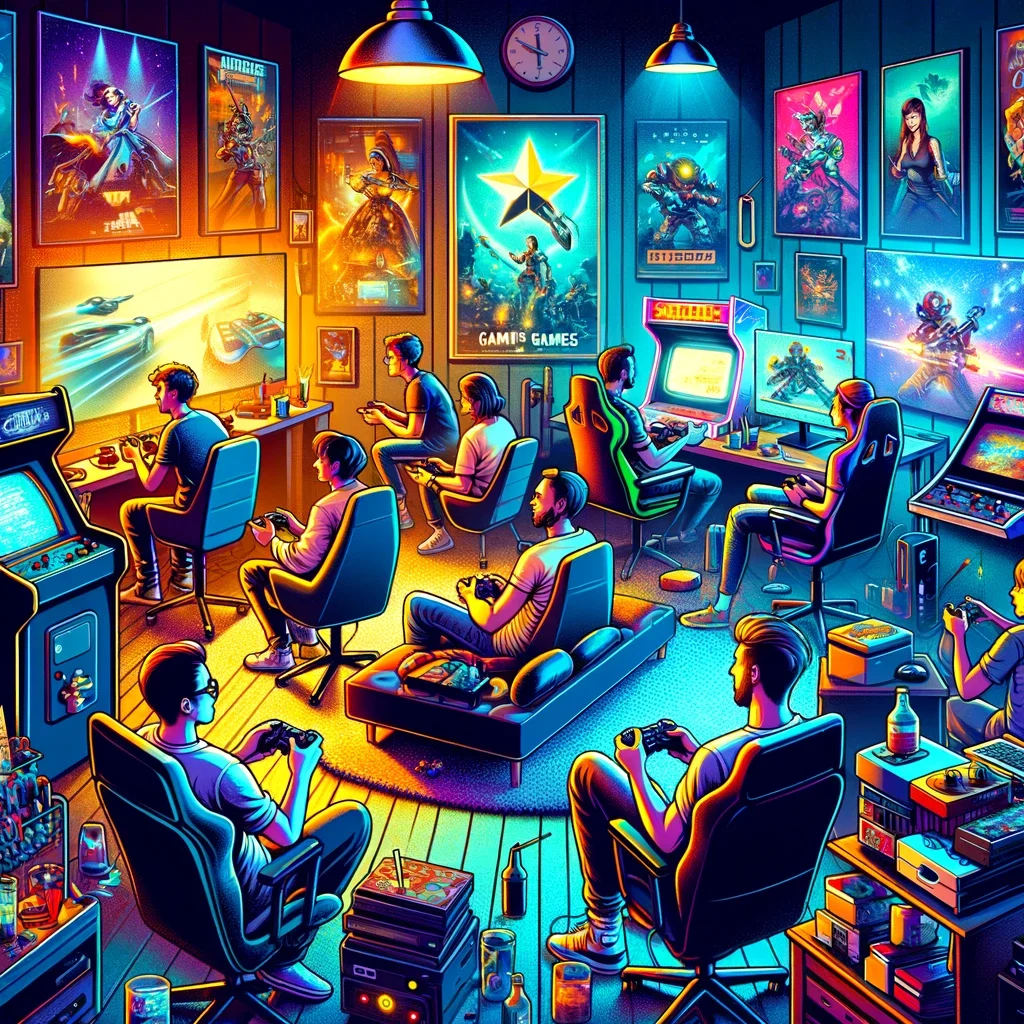Metaverse gaming represents the convergence of virtual reality (VR), augmented reality (AR), and blockchain technology to create immersive gaming experiences within a shared virtual universe. It extends the concept of the metaverse—a digital realm where users interact with computer-generated environments and fellow users in real time.
Metaverse gaming is not just the future; it’s already here. With the growing accessibility of VR and AR technology, players can immerse themselves in expansive virtual worlds. Social gaming, blockchain-driven ownership of in-game assets, and investments by tech giants like Meta and Microsoft are driving its popularity.
Metaverse gaming trends
Increased adoption of VR and AR
The adoption of VR and AR in metaverse gaming is soaring. Affordable and accessible VR headsets are revolutionizing the way players experience games. This technology not only immerses gamers in captivating virtual worlds but also augments their reality, enhancing the overall gaming experience.
Rise of social gaming
Social gaming is surging within the metaverse. Real-time player interactions foster immersive and engaging experiences. Games like Fortnite and Roblox exemplify this trend, where millions of players worldwide collaborate and compete, blurring the lines between virtual and real-world social connections.
Growth of NFTs and blockchain gaming
The growth of non-fungible tokens (NFTs) and blockchain technology is reshaping metaverse gaming. These technologies empower players with true ownership of in-game assets, such as weapons and virtual real estate. They provide security and transparency, ensuring the authenticity and provable ownership of these digital items.
Collaboration between big tech companies
Tech giants like Meta, Microsoft, and Google are heavily investing in the metaverse. Their collective efforts are accelerating its development, making it more accessible to a broader audience. This collaboration marks a pivotal moment in the evolution of metaverse gaming.
Development of new game genres
Metaverse gaming opens the door to entirely new game genres that were previously inconceivable in the physical world. Social VR games, NFT-based gaming, and blockchain games are just a few examples of the innovative genres emerging within this virtual realm.
Increased investment in metaverse startups
The burgeoning interest in the metaverse has led to a surge in investment in startups. This influx of funding is driving innovation, impacting the development of new metaverse products and services that push the boundaries of what’s possible.
Mass adoption of the metaverse
While still in its nascent stages, the metaverse is on a trajectory toward mass adoption. The growing popularity of VR and AR, coupled with the appeal of social gaming and collaboration among tech giants, is propelling the metaverse into mainstream consciousness.
The metaverse is not merely a gaming phenomenon; it’s poised to reshape the global economy. It has the potential to create new job opportunities, generate diverse revenue streams, and disrupt conventional industries, heralding a new era of economic possibilities.
Challenges and risks
Security and privacy risks
In the metaverse gaming landscape, security and privacy risks loom large. The collection and storage of personal data, including user profiles and financial transactions, create vulnerabilities. Threats like data breaches, hacking, and unauthorized access can lead to identity theft and fraud, necessitating robust security measures.
Virtual asset theft and scams
The use of blockchain technology and NFTs introduces the risk of virtual asset theft. Hackers may exploit vulnerabilities in blockchain infrastructure or target players’ digital wallets, resulting in the loss of valuable in-game assets. Furthermore, scams and fraudulent schemes can deceive players into purchasing counterfeit or non-existent virtual items.
Addiction and excessive spending
Metaverse gaming’s immersive nature can lead to addiction and excessive spending. Some players may develop compulsive behaviors, dedicating significant time and money to virtual assets. This can result in financial strain and negatively impact mental and physical well-being, necessitating responsible gaming practices.
Inadequate regulation
The regulatory landscape surrounding metaverse gaming is evolving, and gaps in regulations can pose risks. Issues related to consumer protection, taxation, copyright infringement, and fraudulent activities may emerge due to a lack of oversight and clear guidelines. Advocacy for responsible regulation becomes crucial.
Social and emotional risks
The social aspect of metaverse gaming can expose players to toxic behavior, cyberbullying, harassment, or inappropriate content. Additionally, the blurring of boundaries between virtual and real-life interactions can challenge players’ ability to distinguish between online and offline identities, potentially impacting mental health and social well-being.
Technical challenges and infrastructure limitations
Metaverse gaming demands robust technical infrastructure to ensure seamless gameplay. Network issues, server downtimes, latency, and scalability challenges can disrupt the gaming experience, leading to player frustration and highlighting the need for ongoing technical improvements.
Lack of interoperability and fragmentation
The metaverse gaming landscape may become fragmented, with non-compatible platforms and virtual worlds. This limitation can hinder players’ ability to transfer assets or engage in cross-platform interactions, resulting in a fragmented user experience and reduced value of virtual assets.
Legal and intellectual property concerns
Metaverse gaming involves user-generated content within virtual worlds, raising concerns about copyright infringement and intellectual property rights. Ownership disputes may arise, particularly when players create content based on real-world brands or copyrighted material, necessitating clear legal frameworks.
Health and safety risks
The immersive nature of metaverse gaming, particularly in VR, can lead to physical discomfort, motion sickness, and injuries if players are not mindful of their surroundings. Additionally, excessive screen time and sedentary behavior pose health risks, emphasizing the importance of responsible gaming habits.
Economic instability and virtual economy risks
Metaverse gaming often involves virtual economies where players transact using in-game currencies or assets. Economic instability, market manipulation, hyperinflation, or crashes within these virtual economies can disrupt gameplay, commerce, and the value of virtual assets, warranting vigilance.
Mitigating risks in metaverse gaming
Cybersecurity hygiene
Players and stakeholders must prioritize cybersecurity hygiene to protect personal data and virtual assets. Implementing strong passwords, multi-factor authentication, and regularly updating software are essential steps.
Responsible gameplay
Players should set boundaries for gameplay, manage their time, and monitor spending to prevent addiction and excessive expenditures. Promoting responsible gaming practices helps maintain a healthy balance.
Creating a healthy gaming environment
Fostering a positive and inclusive gaming community can mitigate social and emotional risks. Platforms and developers can enforce strict anti-harassment policies and provide tools for reporting and blocking abusive behavior.
Advocating for regulation and oversight
Active engagement in advocating for responsible regulation and oversight within the metaverse gaming industry is vital. Encouraging transparency, fair practices, and consumer protection measures will contribute to a safer and more enjoyable gaming environment.
Conclusion
Metaverse gaming is witnessing a transformative wave of innovation. The adoption of VR and AR, the rise of social gaming, the growth of NFTs and blockchain technology, collaboration among tech giants, the emergence of new game genres, increased startup investments, mass adoption, and its profound impact on the global economy collectively paint a dynamic and promising picture for the future of gaming.
Amidst the metaverse gaming’s allure, it’s imperative to remain vigilant about the associated risks. From security and privacy concerns to virtual asset theft and addiction, players and stakeholders must prioritize risk awareness and mitigation strategies. Responsible gaming practices, cybersecurity diligence, and advocacy for sound regulation are essential pillars of a safer metaverse.



